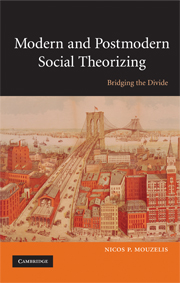Book contents
- Frontmatter
- Contents
- List of figures
- Acknowledgements
- Introduction
- Part I The theoretical background: the development of the agency–structure problematic
- Part II Parsonian and post-Parsonian developments
- Part III Agency and structure: reworking some basic conceptual tools
- Part IV Bridges between modern and late/postmodern theorizing
- Part V Towards a non-essentialist holism
- Instead of Conclusion: Twelve rules for the construction of an open-ended holistic paradigm
- Appendix: In defence of ‘grand’ historical sociology
- References
- Index
Appendix: In defence of ‘grand’ historical sociology
Published online by Cambridge University Press: 05 June 2012
- Frontmatter
- Contents
- List of figures
- Acknowledgements
- Introduction
- Part I The theoretical background: the development of the agency–structure problematic
- Part II Parsonian and post-Parsonian developments
- Part III Agency and structure: reworking some basic conceptual tools
- Part IV Bridges between modern and late/postmodern theorizing
- Part V Towards a non-essentialist holism
- Instead of Conclusion: Twelve rules for the construction of an open-ended holistic paradigm
- Appendix: In defence of ‘grand’ historical sociology
- References
- Index
Summary
Goldthorpe's article ‘The uses of history in sociology’ (1991) raises very interesting problems on the status and future prospects of what Goldthorpe has pejoratively labelled ‘grand’ historical sociology – as this has been developed during the last three decades by historically oriented sociologists like Barrington Moore, Michael Mann, Theda Skocpol, John Hall and others. As I consider the rapid growth of this branch of sociology one of the most fruitful and promising developments in the discipline; and as my own work on the long-term historical developments of some Balkan and Latin American polities (Mouzelis, 1986) has been very much influenced by Moore's work, I would like to make a few brief points in its defence.
The conflation of history and sociology
To begin with, I agree with Goldthorpe on the necessity of maintaining the distinction between history and sociology as two disciplines which, although closely interrelated, portray different logics and methodologies. From this point of view, I am against Abrams's (1982) well-known position as well as the more general postmodern tendency to ignore or demolish all boundaries between social-science disciplines and sub-disciplines. In fact, I think that Goldthorpe's criteria for distinguishing sociological from historical analysis (the monothetic/ideographic distinction and the types of empirical evidence that the two disciplines use) are useful for establishing differences of emphasis between history and sociology.
- Type
- Chapter
- Information
- Modern and Postmodern Social TheorizingBridging the Divide, pp. 279 - 284Publisher: Cambridge University PressPrint publication year: 2008



